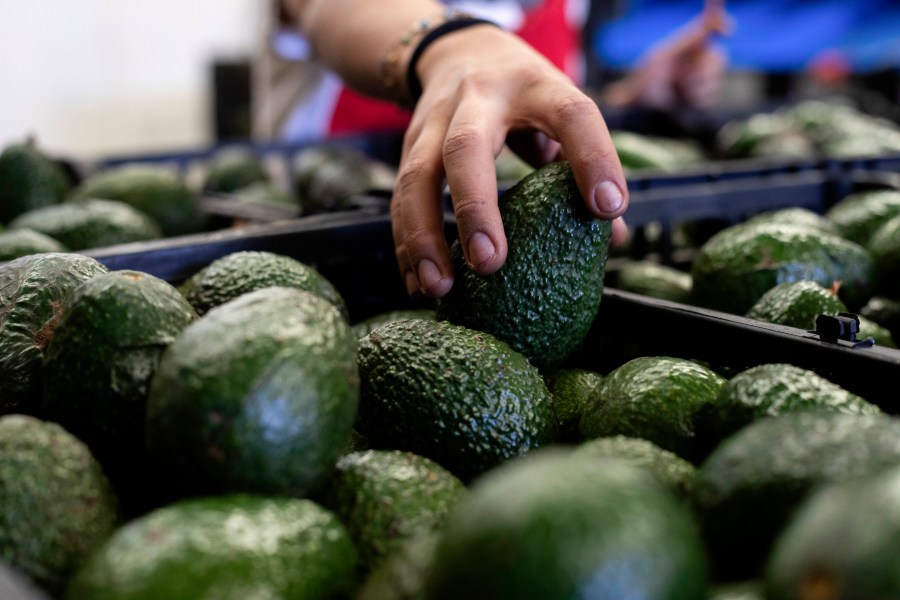The California Avocado Commission (CAC) released a report Tuesday that indicates state-grown avocados may be severely at risk due to a 2024 Biden administration move that withdrew U.S. Department of Agriculture inspectors from Mexican orchards.
“This move, made in response to cartel violence, shifted critical U.S. agricultural oversight to foreign control, undermining decades of bipartisan efforts to protect U.S. agriculture,” the CAC said in a press release.
The report, titled “The Growing Threat to California Avocados: Why USDA Must Reinstate Inspection Protocols in Mexico,” states that in 1997, CAC officials and their federal counterparts negotiated an agreement with the Mexican government that allowed the importation of fresh Hass avocados into the United States.
The agreement lifted a ban that had been in place since 1914 to prevent a range of pests from entering American orchards.
According to the report, the choice to remove USDA’s physical presence from Mexican avocado orchards in 2024 was made without public announcement, congressional notification or input from American avocado growers. In fact, the CAC claimed that they themselves learned of the decision, which they say is “a breach of [the 1997] agreement,” through foreign media outlets.
“This system worked for nearly three decades…[and] functioned with exceptional effectiveness, keeping invasive pests like seed weevils and fruit-boring moths out of California [while] maintaining the state’s pristine pest-free certification,” the report reads. “With no need for chemical interventions against these exotic pests, growers benefited from lower production costs, clean environmental compliance and the ability to export to countries with strict phytosanitary barriers.”
“Mexican inspections alone cannot be trusted to meet the phytosanitary standards the U.S. has long required,” the report continues. “As a result, fruit carrying dangerous pests is now being certified and shipped with reduced oversight, increasing the probability of pest introduction into California’s avocado-growing regions.”

Since the pests have never established themselves in California (which CAC says is thanks to nearly three decades of strict pre-export enforcement by the USDA), the state’s avocado industry, which is a “$1.5 billion economic engine” that supports more than 3,000 family-owned farms, is “fundamentally different” from global competitors because of its cleanliness standards.
California itself is one of the last remaining major avocado-producing regions in the world that remains free of the crop’s main pests — avocado seed weevils and fruit-feeding moths – which allows local growers to thrive with “minimal chemical intervention, high export viability and strong consumer confidence,” according to the report.
“If [these pests] gain a foothold in California orchards, the result would be devastating – biologically, economically and environmentally,” the report says.
According to agriculture officials, the pests may have already started making their way into California; since inspectors were withdrawn, more than 150 pest interceptions were reported between Oct. 30, 2024, and Mar. 11, 2025, the CAC report states. USDA data cited in the report indicates that between Jan. 1 and Oct. 17, 2024, there were no pest interceptions in Mexican warehouses.

Overall, the CAC says that the main solution to the problem is to reinstate inspection protocols in Mexico as per the 1997 agreement. Keeping in mind inspector safety, CAC recommends that security personnel be deployed and inspectors stationed in secure convoys, especially in high-risk regions like the Mexican state of Michoacán, where most avocados are grown.
Additionally, CAC wants direct engagement from the Trump administration to ensure that “criminal cartels [don’t] dictate the terms of our food safety” and the ability to suspend Mexican imports if conditions are not met. According to the report, 80% of Mexico’s avocado imports come to the U.S.
Lastly, the CAC wants to spread public awareness of the issue as not just an agricultural problem, but a national security concern.
“The threat facing California’s avocado industry is not theoretical, it is happening now. Since the withdrawal of USDA inspectors from Mexico in late 2024, dangerous avocado seed pests have been repeatedly detected in Mexican orchards and packinghouses,” the report concludes. “These pests, long excluded by strict inspection protocols, now pose a growing risk of crossing into California’s pest-free growing regions…Once established, they cannot be eradicated, [and] the consequences would be severe: billions in economic losses, the collapse of generational family farms, and the loss of one of America’s most successful, clean, and sustainable agricultural commodities.”
“This crisis was preventable,” the report’s conclusion adds. “It is still reversible.”
